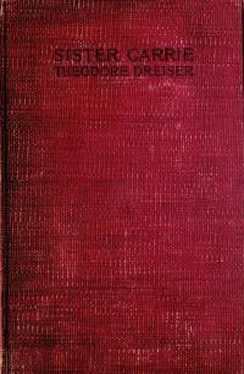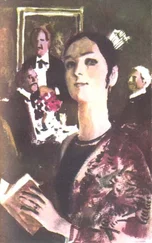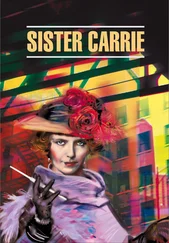Теодор Драйзер - Sister Carrie
Здесь есть возможность читать онлайн «Теодор Драйзер - Sister Carrie» — ознакомительный отрывок электронной книги совершенно бесплатно, а после прочтения отрывка купить полную версию. В некоторых случаях можно слушать аудио, скачать через торрент в формате fb2 и присутствует краткое содержание. Год выпуска: 2004, Жанр: Классическая проза, на английском языке. Описание произведения, (предисловие) а так же отзывы посетителей доступны на портале библиотеки ЛибКат.
- Название:Sister Carrie
- Автор:
- Жанр:
- Год:2004
- ISBN:нет данных
- Рейтинг книги:4 / 5. Голосов: 1
-
Избранное:Добавить в избранное
- Отзывы:
-
Ваша оценка:
- 80
- 1
- 2
- 3
- 4
- 5
Sister Carrie: краткое содержание, описание и аннотация
Предлагаем к чтению аннотацию, описание, краткое содержание или предисловие (зависит от того, что написал сам автор книги «Sister Carrie»). Если вы не нашли необходимую информацию о книге — напишите в комментариях, мы постараемся отыскать её.
Sister Carrie — читать онлайн ознакомительный отрывок
Ниже представлен текст книги, разбитый по страницам. Система сохранения места последней прочитанной страницы, позволяет с удобством читать онлайн бесплатно книгу «Sister Carrie», без необходимости каждый раз заново искать на чём Вы остановились. Поставьте закладку, и сможете в любой момент перейти на страницу, на которой закончили чтение.
Интервал:
Закладка:
He wondered how all these other lodging-house people around him got along. They didn't seem to do anything. Perhaps they begged—unquestionably they did. Many was the dime he had given to such as they in his day. He had seen other men asking for money on the streets. Maybe he could get some that way. There was horror in this thought.
Sitting in the lodging-house room, he came to his last fifty cents. He had saved and counted until his health was affected. His stoutness had gone. With it, even the semblance of a fit in his clothes. Now he decided he must do something, and, walking about, saw another day go by, bringing him down to his last twenty cents—not enough to eat for the morrow.
Summoning all his courage, he crossed to Broadway and up to the Broadway Central hotel. Within a block he halted, undecided. A big, heavy-faced porter was standing at one of the side entrances, looking out. Hurstwood purposed to appeal to him. Walking straight up, he was upon him before he could turn away.
"My friend," he said, recognising even in his plight the man's inferiority, "is there anything about this hotel that I could get to do?"
The porter stared at him the while he continued to talk.
"I'm out of work and out of money and I've got to get something—it doesn't matter what. I don't care to talk about what I've been, but if you'd tell me how to get something to do, I'd be much obliged to you. It wouldn't matter if it only lasted a few days just now. I've got to have something."
The porter still gazed, trying to look indifferent. Then, seeing that Hurstwood was about to go on, he said:
"I've nothing to do with it. You'll have to ask inside."
Curiously, this stirred Hurstwood to further effort.
"I thought you might tell me."
The fellow shook his head irritably.
Inside went the ex-manager and straight to an office off the clerk's desk. One of the managers of the hotel happened to be there. Hurstwood looked him straight in the eye.
"Could you give me something to do for a few days?" he said. "I'm in a position where I have to get something at once."
The comfortable manager looked at him, as much as to say: "Well, I should judge so."
"I came here," explained Hurstwood, nervously, "because I've been a manager myself in my day. I've had bad luck in a way, but I'm not here to tell you that. I want something to do, if only for a week."
The man imagined he saw a feverish gleam in the applicant's eye.
"What hotel did you manage?" he inquired.
"It wasn't a hotel," said Hurstwood. "I was manager of Fitzgerald and Moy's place in Chicago for fifteen years."
"Is that so?" said the hotel man. "How did you come to get out of that?"
The figure of Hurstwood was rather surprising in contrast to the fact.
"Well, by foolishness of my own. It isn't anything to talk about now. You could find out if you wanted to. I'm 'broke' now and, if you will believe me, I haven't eaten anything to-day."
The hotel man was slightly interested in this story. He could hardly tell what to do with such a figure, and yet Hurstwood's earnestness made him wish to do something.
"Call Olsen," he said, turning to the clerk.
In reply to a bell and a disappearing hall-boy, Olsen, the head porter, appeared.
"Olsen," said the manager, "is there anything downstairs you could find for this man to do? I'd like to give him something."
"I don't know, sir," said Olsen. "We have about all the help we need. I think I could find something, sir, though, if you like."
"Do. Take him to the kitchen and tell Wilson to give him something to eat."
"All right, sir," said Olsen.
Hurstwood followed. Out of the manager's sight, the head porter's manner changed.
"I don't know what the devil there is to do," he observed.
Hurstwood said nothing. To him the big trunk hustler was a subject for private contempt.
"You're to give this man something to eat," he observed to the cook.
The latter looked Hurstwood over, and seeing something keen and intellectual in his eyes, said:
"Well, sit down over there."
Thus was Hurstwood installed in the Broadway Central, but not for long. He was in no shape or mood to do the scrub work that exists about the foundation of every hotel. Nothing better offering, he was set to aid the fireman, to work about the basement, to do anything and everything that might offer. Porters, cooks, firemen, clerks—all were over him. Moreover his appearance did not please these individuals—his temper was too lonely—and they made it disagreeable for him.
With the stolidity and indifference of despair, however, he endured it all, sleeping in an attic at the roof of the house, eating what the cook gave him, accepting a few dollars a week, which he tried to save. His constitution was in no shape to endure.
One day the following February he was sent on an errand to a large coal company's office. It had been snowing and thawing and the streets were sloppy. He soaked his shoes in his progress and came back feeling dull and weary. All the next day he felt unusually depressed and sat about as much as possible, to the irritation of those who admired energy in others.
In the afternoon some boxes were to be moved to make room for new culinary supplies. He was ordered to handle a truck. Encountering a big box, he could not lift it.
"What's the matter there?" said the head porter. "Can't you handle it?"
He was straining hard to lift it, but now he quit.
"No," he said, weakly.
The man looked at him and saw that he was deathly pale.
"Not sick, are you?" he asked.
"I think I am," returned Hurstwood.
"Well, you'd better go sit down, then."
This he did, but soon grew rapidly worse. It seemed all he could do to crawl to his room, where he remained for a day.
"That man Wheeler's sick," reported one of the lackeys to the night clerk.
"What's the matter with him?"
"I don't know. He's got a high fever."
The hotel physician looked at him.
"Better send him to Bellevue," he recommended. "He's got pneumonia."
Accordingly, he was carted away.
In three weeks the worst was over, but it was nearly the first of May before his strength permitted him to be turned out. Then he was discharged.
No more weakly looking object ever strolled out into the spring sunshine than the once hale, lusty manager. All his corpulency had fled. His face was thin and pale, his hands white, his body flabby. Clothes and all, he weighed but one hundred and thirty-five pounds. Some old garments had been given him—a cheap brown coat and misfit pair of trousers. Also some change and advice. He was told to apply to the charities.
Again he resorted to the Bowery lodging-house, brooding over where to look. From this it was but a step to beggary.
"What can a man do?" he said. "I can't starve."
His first application was in sunny Second Avenue. A well-dressed man came leisurely strolling toward him out of Stuyvesant Park. Hurstwood nerved himself and sidled near.
"Would you mind giving me ten cents?" he said, directly. "I'm in a position where I must ask someone."
The man scarcely looked at him, but fished in his vest pocket and took out a dime.
"There you are," he said.
"Much obliged," said Hurstwood, softly, but the other paid no more attention to him.
Satisfied with his success and yet ashamed of his situation, he decided that he would only ask for twenty-five cents more, since that would be sufficient. He strolled about sizing up people, but it was long before just the right face and situation arrived. When he asked, he was refused. Shocked by this result, he took an hour to recover and then asked again. This time a nickel was given him. By the most watchful effort he did get twenty cents more, but it was painful.
Читать дальшеИнтервал:
Закладка:
Похожие книги на «Sister Carrie»
Представляем Вашему вниманию похожие книги на «Sister Carrie» списком для выбора. Мы отобрали схожую по названию и смыслу литературу в надежде предоставить читателям больше вариантов отыскать новые, интересные, ещё непрочитанные произведения.
Обсуждение, отзывы о книге «Sister Carrie» и просто собственные мнения читателей. Оставьте ваши комментарии, напишите, что Вы думаете о произведении, его смысле или главных героях. Укажите что конкретно понравилось, а что нет, и почему Вы так считаете.









